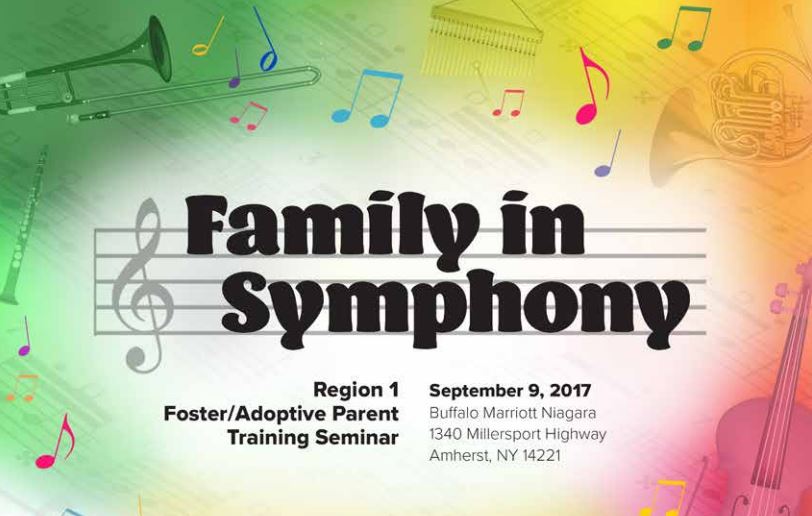September 9, 2017
8:30 am
Venue
Buffalo Niagara Marriott
1340 Millersport Hwy, Amherst, NY 14221
(716) 689-6900
Office of Children and Family Services ( OCFS)
Organizer
Agenda
- 8:30 a.m. – 9:00 a.m. Registration
- 9:00 a.m. – 9:15 a.m. Welcome Heather Dominguez, Senior Project Coordinator, CDHS, ICHP, SUNY Buffalo State
- 9:15 a.m. – 11:00 a.m. Workshop (Session I)
- 11:00 a.m. – 11:15 a.m. Break
- 11:15 a.m. – 1:00 p.m. Workshops (Session II)
- 1:00 p.m. – 2:00 p.m. Luncheon/Closing Remarks
-
Application Deadline: August 4, 2017
Workshop Description (Session I)
Workshop attendance is mandatory for all participants
Applying the Reasonable and Prudent Parenting Standard Understanding and being able and willing to apply the Reasonable and Prudent Parent Standard is very important for foster and adoptive parents in New York State. This workshop will introduce a basic understanding of the standard and then participants will practice applying the standard to various case scenarios to more fully understand it and feel comfortable when applying it in their homes.
Workshop Descriptions (Session II)
Session II Workshops require preregistration. Select one workshop. Local districts and voluntary agencies are encouraged to register through HSLC. Foster parents can register online for the seminar at https://www.bsc-cdhs.org/FosterParentSeminarRegistration/Default.aspx
1. Promoting Child Development
One of the Five Foster/Adoptive Family Role Outcomes is that children will progress in physical, emotional, social, mental, and moral development in accordance with age and developmental capability. To effectively promote the well-being and development of children in their care, foster parents need a working knowledge of the five domains of child development. In this session, foster parents will learn to recognize common behaviors and capabilities of children at each stage of development. Foster parents also will come to appreciate the impact of abuse and neglect on child development. Using a reference guide, they will select and use activities that meet and support the child’s developmental needs.
Wendy Neilson, Senior Education Specialist Center for Development of Human Services (CDHS) Institute for Community Health Promotion (ICHP) SUNY Buffalo State
2. Trauma 101
As a result of attending this training, participants will be able to describe the concept of trauma-informed parenting and its benefits. They will be able to define child trauma and describe how the children in their care may respond to traumatic events. Participants also will be able to define traumatic stress reactions and how they may manifest in children in care. Additionally, they will be able to define resilience and describe how they can promote resilience in the children in their care. Participants will apply the lessons of the training to children currently in their care.
Diana Davis Schultz, Principal Training Specialist Center for Development of Human Services (CDHS) Institute for Community Health Promotion (ICHP) SUNY Buffalo State
3. Fear and Control
This workshop helps participants better understand the dynamics of fear and control and how these issues can become barriers to working in partnership with the parents of children in foster care and the agency. The workshop also helps participants recognize their own fears, those experienced by children in foster care, and those of the caseworker. Participants also will learn how to identify strategies for addressing issues of fear and control.
Jack Fuentes, Senior Education Specialist Center for Development of Human Services (CDHS) Institute for Community Health Promotion (ICHP) SUNY Buffalo State
4. Child Sexual Abuse Overview
A significant number of children in foster care have a history of sexual abuse. When they enter the child welfare system, these children generally need special insights and skills from their caregivers. This workshop for foster/adoptive parents will look at myths and facts regarding child sexual abuse, expected sexual behavior, sexual and nonsexual behavioral signs of sexual abuse in younger and older children, and emotions and needs of children who were sexually abused.
Jennifer Otten, Education Specialist Center for Development of Human Services (CDHS) Institute for Community Health Promotion (ICHP) SUNY Buffalo State
5. Making and Maintaining Boundaries
This workshop helps participants develop an ability to establish boundaries with the parents of children in foster care. Participants will be able to:
- Define the physical, emotional, and social boundaries formed between foster parents and the parents of children in foster care.
- Identify how and why boundaries are set.
- Explain the importance of boundaries as they relate to children in foster care.
- Differentiate between defensive boundaries and shared, negotiated parenting boundaries.
- Describe the boundaries that parents of children in foster care may impose at the time of the family’s reunification.
- Identify specific boundary issues that should be considered and ways of establishing boundaries.
Dan Godwin, Education Specialist Center for Development of Human Services (CDHS) Institute for Community Health Promotion (ICHP) SUNY Buffalo State

